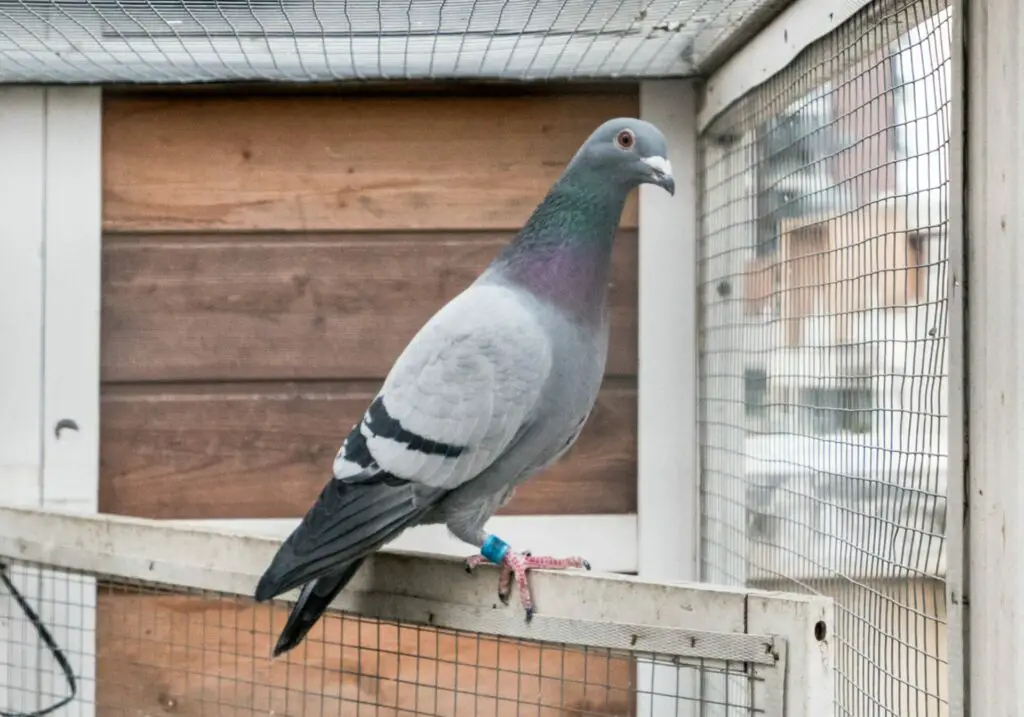In and around the loft
A loft that is not well-maintained, infested with rodents, has lack of airflow, is too humid or that allows stray birds in and amongst your pigeons is a recipe for numerous health conditions.
Therefore, it is important that you take every precaution to ensure that the pigeons are living in an environment properly suited to promoting good health and well-being from a physical standpoint as well as a mental one.
Things to keep in mind
- Keep wild birds and rodents away from the loft and pigeons
- Quarantine newly acquired birds
- Keep the loft dry and damp-free
- Sanitize feeders and drinkers regularly
- Do not allow feed to come into contact with droppings
- Baskets should be disinfected weekly
Overcrowding
Overcrowding can be severely detrimental to a pigeon’s health yet it is often overlooked as fanciers prioritise building larger and larger teams year on year without first considering the capacity of their available facilities, i.e. section, boxes and perches.
Not only does overcrowding increase feather dust and can create excess moisture, but as they reach about 8 weeks old pigeons start to become territorial and compete with one another. Therefore, each pigeon needs space to call its own, be it a perch or box, otherwise there will be non-stop fighting.
Another thing to keep in mind is that males are comparatively more competitive than hens, so it’s advisable to keep fewer cocks than hens per cubic meter of loft space.Aside from negative affects on health, an overcrowded loft may suffer more ‘flyaways’ as well as a drop in fertility rates, almost as if the pigeons can sense a lack of available resources, be it space or air.
Oxygen levels
To be in perfect health a pigeon requires “660 litres of pure oxygen” on a daily basis. [2]Having more pigeons than the loft has enough fresh air to support means that some birds will be deprived of the pure oxygen they require.
More on oxygen and ventilation in the loft.
Stress
Lack of territory, fresh air and other factors creates stress, this in turn can lead to a number of second and third-order consequences.
For example, stress robs pigeons of their appetite which in turn brings the bacteria in the intestines into a state of imbalance making the pigeon more susceptible to diseases such as E. coli.
Vaccinations
The main vaccinations for racing pigeons include those for poxvirus, paratyphoid and paramyxovirus (PMV). Paramyxovirus vaccinations are mandatory in many countries, including the UK, Netherlands and Belgium, pigeons without a PMV vaccination certificate are unable to complete.
Poxvirus (Pigeon Pox)
Pigeons should be vaccinated against pox when they are 5 weeks old then once every year at least 3 weeks before the start of the racing season. [1]
Contrary to popular belief, vaccinating a pigeon once for pox does not mean lifelong immunity, however, pigeons that have come into contact with the virus ‘naturally’, as it were, are unlikely to get it again. There are a number of vaccines on the market that vaccinate against both pox and paramyxovirus. But while these can save time and money, they are not necessarily as effective as regular vaccines.
Paramyxovirus
Vaccinations for paramyxovirus should only be given once the pigeons are at least 3 weeks old, and then again yearly at least 3 weeks before breeding. The best time to vaccinate young birds is when they are between 6 and 8 weeks old. [1]
According to veterinarians, it is unnecessary to vaccinate pigeons for paramyxo that are not being raced on a yearly basis, instead, you may vaccinate once in the year of birth and then again as a yearling.
Salmonella/Paratyphoid
Vaccinating for salmonella to guard against paratyphoid infection should be done after the pigeons are 5 weeks old then twice again with 2-week intervals, then 3 to 4 weeks before breeding. [1]
Before vaccinating against salmonella it is important to first verify that no salmonella infection exists in the loft by having a laboratory test conducted.
Adverse reactions and even death can occur if pigeons that already have salmonella are vaccinated. Vaccinating with an auto vaccine made from a culture from your own pigeons is recommended following a treatment with Parastop, Baytril or Trimetroprim.
Points to remember when vaccinating
- Never vaccinate pigeons that are already ill. Doing so will worsen their condition, furthermore, in their runned-down state the pigeon won’t have enough strength to build up an immunity against the disease you have vaccinated for, meaning that the vaccine won’t work properly.
- If any pigeons need vaccinations, be sure to do so at least one month before racing, breeding or moulting periods.
- Never use vaccines that are out of date or that have not been stored correctly
Preventive medications
First and foremost, medication should generally only be given if the bird(s) have been diagnosed and you know what you are treating for.Trichomoniasis (Canker), of course, is the exception to this rule and generally needs to be kept under control at all times through the use of “preventive” medications. [1]While it’s not generally advised by avian veterinarians [1], it’s worth noting that some fanciers also insist on including Coccidiosis in their prevention-through-medication activities.
References:
[1] Harrison, G., DVM, Dipl ABVP-Avian, Dipl ECAMS, Lightfoot, T., DVM, Dipl ABVP-Avian (2005). Clinical Avian Medicine – Volume II.Management of Racing Pigeons. 850-860. Spix.
[2] Martin, D. (2012, October 21). Pigeons and oxygen consumption. Pipa. https://www.pipa.be/en/articles/pigeons-and-oxygen-consumption-9345

